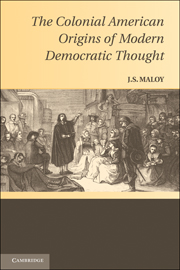Book contents
- Frontmatter
- Contents
- Preface
- 1 Introduction: Accountability and Democratic Theory
- 2 Radical Trust and Accountability in the Seventeenth Century
- 3 Fidelity and Accountability in Virginia and Bermuda
- 4 Politics and Ecclesiastics in Plymouth and Massachusetts
- 5 Constitutional Conflict and Political Argument at Boston
- 6 Democratic Constitutionalism in Connecticut and Rhode Island
- 7 Conclusion: Anglophone Radicalism and Popular Control
- Bibliography
- Index
3 - Fidelity and Accountability in Virginia and Bermuda
Published online by Cambridge University Press: 03 December 2009
- Frontmatter
- Contents
- Preface
- 1 Introduction: Accountability and Democratic Theory
- 2 Radical Trust and Accountability in the Seventeenth Century
- 3 Fidelity and Accountability in Virginia and Bermuda
- 4 Politics and Ecclesiastics in Plymouth and Massachusetts
- 5 Constitutional Conflict and Political Argument at Boston
- 6 Democratic Constitutionalism in Connecticut and Rhode Island
- 7 Conclusion: Anglophone Radicalism and Popular Control
- Bibliography
- Index
Summary
But admit that we could not enjoy the same long, but that the English there would aspire to government of themselves.
Richard Hakluyt, ca. 1580 (Taylor 1935, 143)In the descriptive, promotional, and polemic literature of the early Virginia and Bermuda colonies, the outstanding feature is moral critique – a discourse of virtue and corruption. Aside from the crucial minutiae of latitude and longitude or silkworms and sassafras, a sweeping moralism is what unifies most of the extant writings on the transatlantic activities of the Virginia Company during its short lifetime, from 1606 to 1625. This moralism, continuing certain tendencies from the previous generation of Elizabethan colonial literature, set a precedent for future colonies by conceiving England's American plantations as commonwealths in their own right. Capt. John Smith was the outstanding figure in this line of thought.
Moralism was joined by proceduralism among the political themes discussed in relation to Virginia and Bermuda. The interaction of these two, especially during debates around the dissolution of the Virginia Company in 1624, brought ideas of trust, and of discretion and accountability, to bear on the institutional-design phase of colonial discourse. Among the ways of joining trust to the common good which emerged from these debates, one led to the notion of a morally self-sufficient and practically self-governing colony featuring internal mechanisms of accountability. John Bargraves was the outstanding figure in this second phase of theoretic development.
A substantial historiography has established the prominent place of the moral philosophy of classical humanism in early English thinking about colonization generally (Jones 1946; Quinn 1976; Fitzmaurice 2003, ch. 2), and this basic insight applies to the Virginia discourse of virtue in particular (Fitzmaurice 1999; Fitzmaurice 2003, ch. 3).
- Type
- Chapter
- Information
- Publisher: Cambridge University PressPrint publication year: 2008



